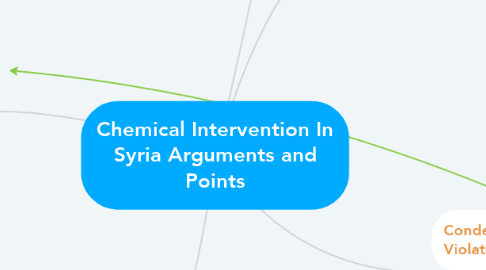
1. Investigative Intervention
1.1. Russia
1.1.1. They suggested to further investigate the Khan Sheikhoun and the Shayrat air base casualty claims before intervening
1.2. Syria
1.2.1. Syria is preventing a U.N. chemical weapons inspector from traveling to Damascus to determine who carried out a deadly April 4 sarin attack on the town of Khan Sheikhou
1.2.1.1. Authorities are withholding critical evidence
1.2.2. Blames terrorists and rebel groups for casualties but activists say it was the military
1.2.3. Khan Sheikhoun was held by rebel forces
1.3. Canada
1.3.1. Has contributed 2.5 million to the OPCW to investigate in Syria
1.3.1.1. Canada’s Weapons of Mass Destruction Threat Reduction Program reinforces Canada’s position as one of the largest national contributors to end the use of chemical weapons in Syria
2. Historical pattern of extreme circumstances and precedent case
2.1. Nicaragua Case: United States violated international law by supporting armed contra rebels
2.2. 2003 invasion of Iraq by the US and UK
2.3. United States has created their own customary international law by intervening without the approval of the UN
2.4. Kosovo bombing in 1999 by NATO
3. Organisation for the prohibition of chemical weapons
3.1. Syria
3.1.1. The OPWC confirmed that they shipped out all of Syria's declared chemical weapons and destroyed them, however Syria continued to use chlorine constructed bombs, as chlorine is not illegal (1)
3.1.2. Didn't sign the OPCW but in 1925 signed the Geneva Protocol, which banned the use of chemical and bacteriological warfare
3.1.2.1. Geneva wants Syria and the Al-Assad regime to submit a comprehensive list of its chemical weapons stockpile, but they haven't responded
3.1.3. OPCW wants Syria to fully disclose and allow access to the locations to the chemical attacks to investigate (1)
3.1.4. There are 3 locations that have not been confirmed to have destroyed chemical weapons (2)
3.1.5. Council has determined that any use of chemical weapons is a threat to international security (2), and under the UN Charter Chapter 7, this is an exception to the Doctrine of Non-intervention
4. Right to Intervene due to Overwhelming humanitarian necessity/ Overwhelming military necessity
4.1. United Kingdom
4.1.1. Wants chemical weapons condemned under Chapter VII of the Charter of the United Nations
4.1.2. Believes it should be referred to the International Court as a war crime
4.2. France
4.2.1. Has evidence of chemical attacks
4.2.1.1. As does US and UK intelligence
4.2.1.1.1. Russian and Syrian intelligence, on the other hand, have stated that no evidence of chemical attacks against civilians has been found
4.3. United States of America
4.3.1. Has drafted a resolution backing military force in Syia
4.3.1.1. Threatened ballistic missile attacks, which may violate international law
4.4. Canada
4.4.1. Trudeau has stated that the Al-Assad regime must be held accountable for war crimes
4.4.1.1. Blames Russia and Iran for abetting
5. Condemns Intervention due to Violation of International Law
5.1. Russia
5.1.1. Russia vetoed intervention
5.1.1.1. Russia is a a permanent member of the security council and has veto power
5.1.1.2. They are allied with Syria
5.1.1.3. China condemns interventions, due to their alliance with Russia
5.1.1.3.1. Agrees with the OPCW's investigations into the chemical attacks (2)
5.1.1.3.2. Disagrees with the UK about how this matter was handled (2)
5.2. United Nations
5.2.1. Has not permitted forceful intervention
5.2.2. Ban Ki-Moon former secretary-general of the UN, agrees that Syria has committed a war crime
5.2.3. After chemical attacks in Ghouta, the UNSC told the Syrian Government to destroy all of their chemical weapons (1)

